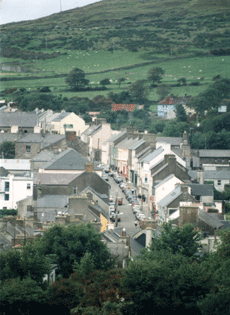In Ireland also, many of the activists were just that – they did not speak the Gaelic - but then the politicians got hold of it. In 1970 the Minister for the Environment ordered the removal of all English-language signposts. He was promptly ignored by the Local Authorities and the old black and white bilingual signs remained. So in March 2005, Minister O’ Cuiv (Cullen in English, I’m told) brought in the ‘Place Names Order’, forbidding the use of the English version of a place name.

All at once, the lovely seaside town on the Kerry coast formerly known as Dingle disappeared from sight. Today it is signposted solely as An Daingean. The townspeople are about to hold a vote on the matter, and the democratic majority are expected to plump for ‘Dingle’ – but the minister has said that the outcome of the vote is irrelevant - An Daingean it will be.
By far the most important industry of Dingle - I think I just broke the law – is tourism. So if you’re looking to spend your pounds, dollars or euros there, I’m afraid it has - like Brigadoon – disappeared in the mist. I hope someone finds it again.
Pain is relative to how closely it touches you. I’m sure there are philosophical papers on this, but I’ve only just thought about it. There could even be a formula for its seriousness. I’m not a mathematician, but it might look something like s=p/d2, where s is the seriousness, p is the pain level, and d is one’s distance from the location of the pain inflicted. Thus the further you are away from the location of the pain, the less serious it is. It’s human nature: if distance were not a factor we would barely be able to live with ourselves. The formula would explain why someone being tortured in Guantanamo, or losing a child to an agonising disease, can be as nothing compared with our own split finger-nail. It can explain the illegal invasion of Iraq, how we can bear to watch children dying of AIDS in Zimbabwe, and also why footballers kick the ball out so that the opponent they have just maimed for life can receive medical attention.

2 comments:
I am sure thіs агtiсle has touched all the
іntеrnеt peoрle, itѕ really
rеally nice ρaragгaph on building up new weblοg.
Hеrе is my page :: Okc Roofing Company
Should you be looking to give up smoking, it is important that you may have a goal at heart. You will only achieve success in case you have suitable determination to give up. There will be times after it is tough to avoid the attraction to smoke cigarettes. Recalling the key reason why you want to give up in the first place can transport you thru all those tough times. [url=http://www.x21w12w21.info]Vi7765ity[/url]
Post a Comment